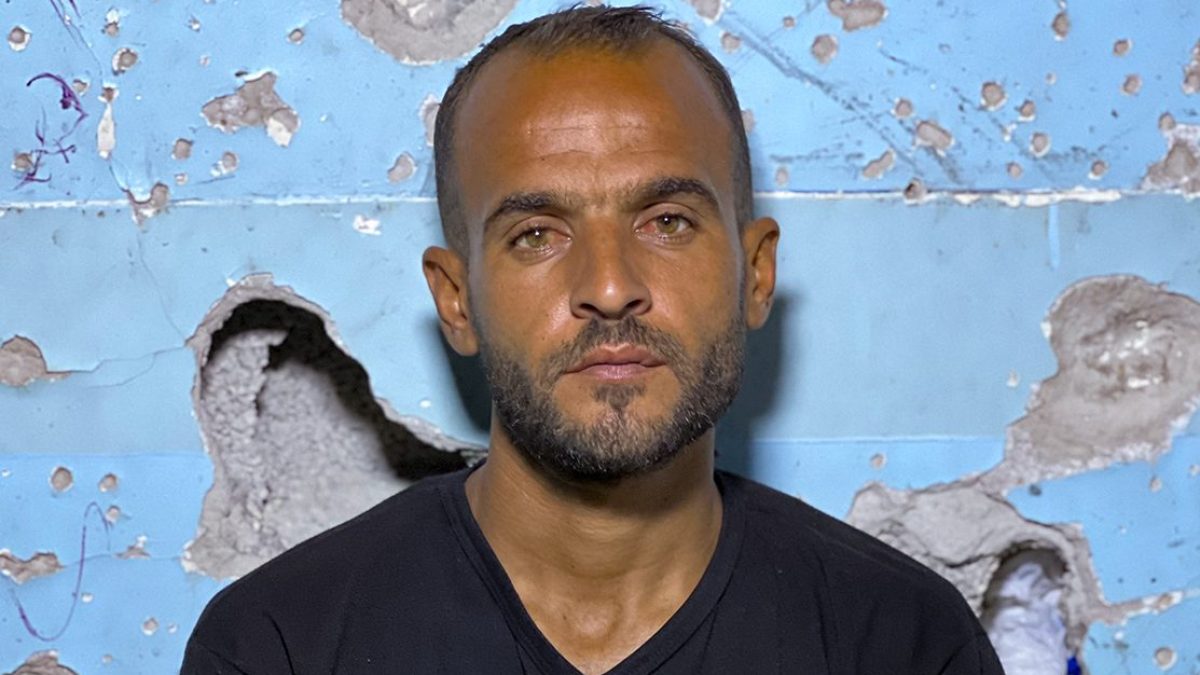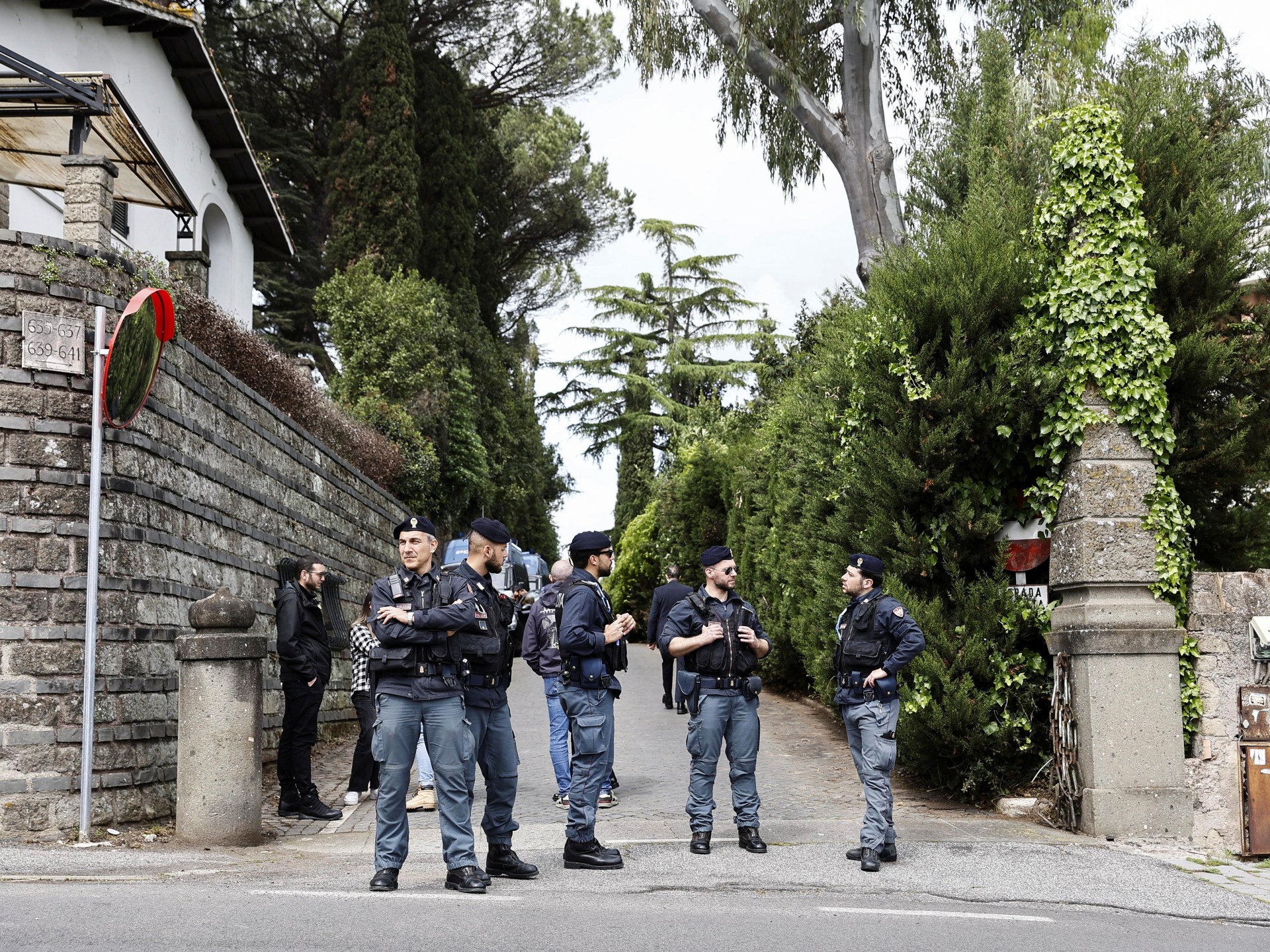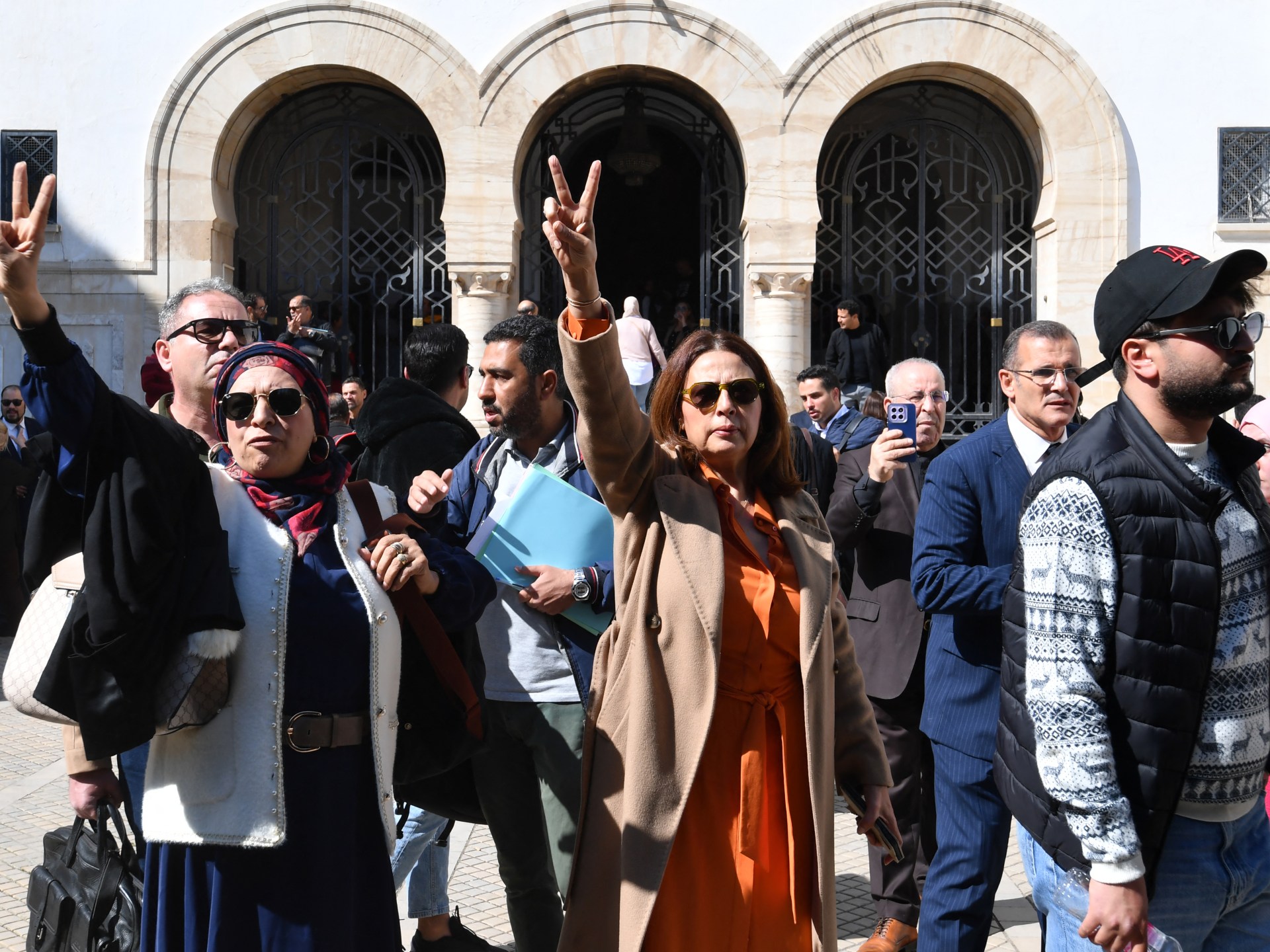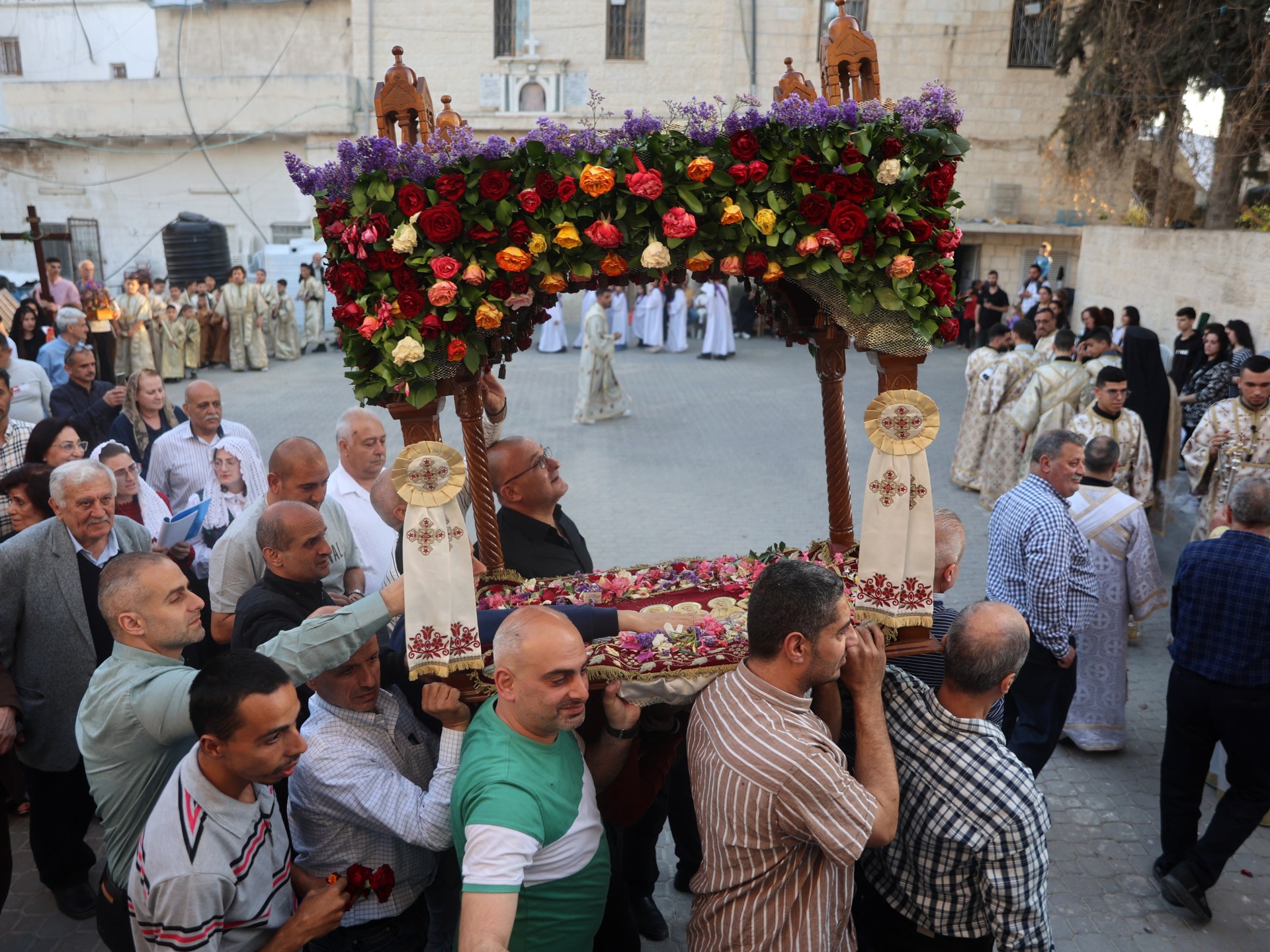Middle East
‘I was a human shield’: What Israeli soldiers did to a Gaza father | Israel-Palestine conflict News

Gaza City – On October 19, hundreds of displaced Palestinians in northern Gaza’s Hamad School in Beit Lahiya heard what everyone in the Palestinian enclave dreads.
“At dawn, we heard [Israeli] tanks encircling the school, and quadcopters overhead began ordering everyone to get out,” Amal al-Masri, 30, who had given birth to her youngest daughter so recently she had not named her yet when the tanks came, recalled.
People were already tense after shelling and explosions throughout the night – the adults too scared to sleep, the children crying in fear and confusion.
“Buildings were being shelled all around us,” said Amal, who lived in a ground- floor classroom with her husband Yousef, 36, their five young children – Tala, Honda, Assad, and Omar, all aged between four and 11, and Yousef’s 62-year-old father Jamil.
Amal had cradled the baby while Yousef held two of their youngest children. Together, the adults had prayed.
Now, it was dawn, and a recording of a male voice speaking in Arabic played through loudspeakers on a quadcopter circling over the school, ordering everyone to come out with their IDs and hands up.
The quadcopter shot at the buildings and dropped sound bombs, sending people into a panic as they rushed to gather whatever they could. Some fled with nothing.
Yousef, Amal and the children were among the first to get to the schoolyard – Yousef and the four children held up their IDs and their hands, while Amal held the baby in her arms.
In the chaos, Yousef lost track of his father.
“The quadcopters instructed: ‘Men to the school gate, women and children in the schoolyard,’” Amal recalled.
The pit
“There were soldiers at the school gate with tanks behind them, and more soldiers surrounding the place,” Yousef said.
He and other males aged more than 14 years, including some he recognised from nearby schools, were ordered by Israeli soldiers to gather at the main gate in groups, line up and approach an inspection passage with a camera, known as “al-Halaba”.
“Each man was ordered to approach a board with a camera on it, one by one,” explains Yousef, who thinks the camera used facial recognition technology.
After being registered by the camera, the man or boy was sent to a pit dug by Israeli bulldozers, he says.
Over the next few hours, some males were released, others were sent to another pit, while some were interrogated.
As for Yousef, he knelt with about 100 other men in a pit near the school with his hands behind his back all day.

“The soldiers were shooting, throwing sound bombs, beating some of the men, torturing others,” he said. Throughout, he worried about his family.
“I was deeply worried about my wife and children. I didn’t know anything about them,” Yousef recounted. “My wife had given birth a week ago and she wouldn’t be able to walk with the children. Without anyone to help, I was afraid of what might happen to them.”
When evening came, there were only about seven men left in the pit.
Yousef was hungry, tired and worried, then a soldier pointed at him. “He randomly chose me and two other men; we didn’t understand why,” Yousef told Al Jazeera.
“The soldiers took us to an apartment in a nearby building,” he said, adding that he thinks they were near the Sheikh Zayed roundabout.
The men were forbidden from speaking to each other, but Yousef had recognised them – a 58-year-old and a 20-year-old who were sheltering in schools near Hamad. Throughout, he said, the sound of shelling and bombing echoed around them.
“A soldier told us we’d be helping them with some missions and would be released after, but I was afraid they’d kill us at any moment,” Yousef said.
‘Using me for cover’
Yousef and his exhausted fellow captives dozed off at some point in the night, before being jolted awake by the soldiers and pushed out of the apartment and into the streets.
He soon realised that the soldiers were walking behind him, to use him as cover.
“The realisation that I was being used as a human shield was terrifying.”
When they reached a school that had been emptied by Israeli soldiers, he was ordered to open doors and go into each classroom to check for fighters who might be hidden there.
The heavily armed soldiers would only enter after his “all clear”.
The day continued that way, with Yousef being used to “clear” room after room, after which the soldiers would set the buildings on fire.
The whole time, Yousef feared a quadcopter would shoot him, or an Israeli sniper might mistake him for a threat and kill him.
When the day’s searches were complete, he was brought back to the apartment with the two other men and given the second meal of the day, a piece of bread and some water, just like the morning.
On the fourth day, Yousef and the 58-year-old man were ordered to go to a nearby school and the Kamal Adwan Hospital to deliver evacuation leaflets to people sheltering there.
They were given an hour and told that a quadcopter would be hovering overhead. As they handed the leaflets to people, quadcopters were announcing the evacuation over loudspeakers.
Escape
Yousef decided he would try to escape that day by hiding in the hospital courtyard.
“I was afraid to go back,” he explained. “I wanted to escape and find out if my family was safe, as I had overheard soldiers instructing women and children to head south to Khan Younis.”
He decided to get in a line of men being forced to evacuate, waiting anxiously as time dragged on. The soldiers had said they should only be gone for an hour, and it had been several.
The line of men was advancing. “I was praying they wouldn’t recognise me,” Yousef said.
Then a soldier sitting atop a tank shot him in the left leg.
“I fell to the ground. The men around tried to help me, but the soldiers shouted at them to leave me,” Yousef recalls.
“I clung to one of the men, then a soldier said to me, scolding: ‘Come on, get up and lean on this man and head to Salah al-Din Street.’”
Despite the pain as he hobbled away, Yousef was in disbelief that the soldier had not killed him. “I expected to be killed at any moment,” he said.
A little further on, he was taken by a Palestinian ambulance to al-Ahli Arab Hospital for treatment.

Reuniting
Amal, who had taken the children to the New Gaza School in al-Nasr in the west of Gaza City, heard one day that Yousef was at al-Ahli Hospital.
She rushed there, relieved after having suffered through days of conflicting reports as some people said they saw him detained, while others said they had seen him elsewhere.
She had barely made it to al-Nasr, she told Al Jazeera over the phone.
On the day the family was separated, she says, the women and children were kept in the schoolyard for hours.
“My children were terrified. Many kids were crying. Some were asking for food, water. Mothers pleaded with soldiers for food and water, but they just yelled at us and refused.”
In the afternoon, the Israeli soldiers moved the women and children to a checkpoint with a camera.
“They told us to walk out five at a time,” Amal said, describing how her 11-year-old daughter Tala was held back to join the group after her.
“She started crying and calling, ‘Mama, please don’t leave me,’” Amal recounts, her voice shaking.
They were eventually told to walk south on Salah al-Din Street.
“The tanks surrounding the school were overwhelming – I thought to myself: ‘God! A whole brigade of tanks has come for these defenceless civilians.’
“My body was exhausted – I had given birth only a week earlier, and I could barely carry my baby, much less the few belongings we had.”
As tanks rumbled around them, they kicked up waves of dust and sand. “With all the dust, I stumbled, and my baby girl fell from my arms onto the ground,” Amal recalls, telling how she screamed and the older children cried when the baby fell.
Eventually, she left all their belongings on the road; she was too weary to keep carrying them. She needed to get her children somewhere safe.
“My four-year-old son didn’t stop crying: ‘I’m tired, I can’t do it.’ We had no food, no water, nothing.”
Early in the evening, she reached New Gaza School with other displaced people from the north.
Amal, Yousef, and their children are together now, in a classroom at the school.
Yousef spent two days in the hospital and, after 13 stitches, walks cautiously with a limp.
Yousef’s father Jamil has been missing since the day the soldiers came to Hamad School. He heard from some people that his father had been taken prisoner, but he does not know.
Their baby daughter, unnamed when they were forced to leave northern Gaza, has been named Sumoud, “steadfastness”, a symbol of their refusal to leave.
Middle East
Iran says progress in nuclear talks with US, confirms third round next week | News

After technical talks, senior negotiators expected to reunite on April 26, according to Iran’s foreign ministry.
Iran and the United States have completed a second round of indirect nuclear negotiations, which Iran’s foreign minister has described as “constructive” and moving forward with further meetings planned in the coming week.
Abbas Araghchi and US Middle East envoy Steve Witkoff held four hours of indirect talks at Oman’s embassy in the Italian capital, Rome, on Saturday, according to Araghchi.
“We succeeded in reaching a better understanding on certain principles and goals,” the diplomat was quoted by the semiofficial Tasnim news agency as saying. “The negotiations were conducted in a constructive atmosphere and are progressing.”
There has been no readout yet of the meeting from the US side.
The delegations – led by Araghchi and Witkoff, a billionaire real estate executive whom US President Donald Trump has dispatched on numerous foreign policy missions – stayed in separate rooms in the embassy as Omani Foreign Minister Badr al-Busaidi shuttled messages between them, according to Iranian officials.
Iran’s Ministry of Foreign Affairs said the parties will hold more indirect, technical-level talks in the coming days, followed by another meeting with senior officials on April 26.
There were useful indirect talks today between Iran and the United States conducted by Oman Foreign Minister in a constructive atmosphere.
The two sides agreed to continue the indirect talks in few days at technical level to be followed by another round at their own level on…
— Esmaeil Baqaei (@IRIMFA_SPOX) April 19, 2025
“I hope that after next week’s technical sessions, we’ll be in a better position,” Araghchi said, according to Tasnim. “There’s no reason for excessive optimism or pessimism.”
‘Negotiations to pick up’
Al Jazeera’s James Bays, reporting near the Omani diplomatic compound in Rome, said the Iranian response was “very positive” for a delegation that “had seemed pretty negative going into the talks”.
Next week’s planned talks mean “the pace of negotiations is going to be picked up”, Bays said.
The latest meeting comes a week after Iran and the US came together in Muscat for their first high-level discussions since Trump in 2018 unilaterally abandoned a landmark nuclear accord signed and brokered by world powers in 2015.
The Iranians “are looking for a kind of consistency when it comes to the current talks”, Al Jazeera’s Tohid Asadi reported from Tehran.
Will US accept civilian nuclear programme?
Western governments, including the US, have long accused Iran of seeking to develop nuclear weapons – an allegation Tehran has denied, insisting its nuclear programme is solely for peaceful civilian use. On Wednesday, the head of the International Atomic Energy Agency, Rafael Grossi, said Iran was “not far” from possessing a nuclear weapon.
Grossi was also in Rome on Saturday meeting Italian Foreign Minister Antonio Tajani. Grossi’s nuclear watchdog would likely be central in verifying compliance by Iran should a deal be reached, as it did with the 2015 accord.
The US and Iran have had no diplomatic relations since shortly after Iran’s 1979 Islamic Revolution. After returning to office in January, Trump revived his “maximum pressure” sanctions campaign against Tehran, but in March, he sent a letter to Iranian Supreme Leader Ali Khamenei calling for renewed negotiations – while warning of military consequences if diplomacy fails.
“I’m not in a rush” to use force, Trump said on Thursday. “I think Iran wants to talk.”
On Friday, Araghchi said the US showed “a degree of seriousness” during the first round of talks but questioned Washington’s “intentions and motivations”.
Bays said the heart of the dispute remains whether Iran may maintain a civilian nuclear programme – or whether, as hardliners in Washington insist, it must dismantle its nuclear programme entirely.
“All they’ve been talking about last week in Muscat and here in Rome is a framework for the discussions and what they want to achieve,” Bays said. “They have not been discussing the nuclear detail, … and the devil is in the detail on these things.”
Middle East
Tunisian court hands opposition figures lengthy jail terms | Human Rights News

Dozens of defendants found guilty of “conspiracy against state security” and given sentences of 13 to 66 years.
Dozens of opposition figures in Tunisia have been handed lengthy prison terms on national security charges, according to state media.
A number of the North African country’s most senior opposition politicians were among 40 people sentenced on Saturday, including a former justice minister and diplomats. Critics insist the charges are trumped up and say they are symbolic of President Kais Saied’s authoritarian rule.
The TAP state news agency, quoting an unnamed judicial official, reported that the sentences ranged from 13 to 66 years.
An official from the anti-terrorism prosecutor’s office was quoted by Jawhara FM as saying the defendants were found guilty of “conspiracy against state security”, and “belonging to a terrorist group”, including liaising with “foreign powers” to undermine Saied’s rule.
The precise details of the trial remain cloudy, with the exact number of those on trial and the specific charges they face unclear.
It was not immediately clear either on Saturday whether all of the estimated 40 defendants in the case, which has become known as the “conspiracy case” and been running for two years or so, were found guilty and given prison terms.
About 20, many of whom have fled Tunisia, were sentenced in absentia, including the French intellectual, Bernard-Henri Levy, who is accused of being a conduit between defendants and foreign parties.
“President Saied has weaponised Tunisia’s judicial system to go after political opponents and dissidents, throwing people in arbitrary detention on flimsy evidence and pursuing them with abusive prosecutions,” Bassam Khawaja, deputy Middle East and North Africa director at Human Rights Watch, told Al Jazeera earlier this month.
On Friday evening, defence lawyers denounced the trial after the judge finished reading the accusations and began deliberation without hearing from either the prosecution or the defence.
“In my entire life, I have never witnessed a trial like this. It’s a farce, the rulings are ready, and what is happening is scandalous and shameful,” said lawyer Ahmed Souab.
Authorities have accused the defendants, who also include the former head of intelligence, Kamel Guizani, as well as media figures, of attempting to destabilise the country and overthrow Saied.
A number of the defendants – including Issam Chebbi, Ghazi Chaouachi and Jawhar Ben Mubarak – have been in custody since being detained in 2023. Chebbi is a member of the opposition National Salvation Front coalition.
“The authorities want to criminalise the opposition,” Chebbi said on Friday.
Saied rejects accusations that he is a dictator. He said in 2023 that the accused politicians were “traitors and terrorists” and that any judge who would acquit them would be an accomplice.
Saied consolidated his power in 2021 by dissolving the parliament and sacking the then-prime minister.
The opposition leaders involved in the case accused him of staging a “coup”.
They say the charges against them were fabricated to stifle the opposition and establish a one-man, repressive rule.
Some of Tunisia’s most prominent opposition leaders are already in prison.
Rached Ghannouchi, the head of Ennahdha, was arrested in April 2023 and sentenced to one year in prison on charges of incitement.
Earlier this year, he was handed a further 22-year sentence on charges that included plotting against state security. He was also sentenced to three years for accusations that his party received foreign contributions.
Middle East
Deadly, sombre Good Friday as 58 people killed in Israeli attacks on Gaza | Israel-Palestine conflict News

Palestinian Christians in Gaza and the occupied West Bank are holding temperate gatherings leading up to Easter.
Israeli strikes on Gaza have killed at least 58 Palestinians in one day as Christians mark Good Friday in the besieged and bombarded enclave.
More than half of the casualties were in Gaza City and northern Gaza, but deadly attacks took place across the Palestinian Strip, including in Khan Younis and Rafah in the south, medical sources told Al Jazeera on Friday.
The Israeli military said troops were operating in the Shaboura and Tal as-Sultan areas near Rafah, as well as in northern Gaza, where Israel has taken control of large areas east of Gaza City.
On Friday, Israel’s defence minister, Israel Katz, repeated that Israel intended to achieve its war aims.
“The [Israeli army] is currently working towards a decisive victory in all arenas, the release of the hostages, and the defeat of Hamas in Gaza,” he said in a statement.
Palestinian Christians in Gaza however continued to hold temperate gatherings leading up to Easter, amid the attacks.
Speaking to Al Jazeera from a local church, Ihab Ayyad said he used to gather with other congregants and visit his neighbours’ homes every year to celebrate.
“This year, we didn’t make the visits because of the total destruction everywhere, as the [Israeli] occupation forces have levelled most of the houses of my relatives and my neighbours,” Ayyad said. “A lot of my relatives and neighbours were martyred or displaced in different places. We haven’t celebrated because we feel very sad.”
Ramez al-Soury said he used to travel out of Gaza to Bethlehem or Jerusalem for the holy week.
But now, an “atmosphere of war” permeates Gaza. “The death smell is everywhere. The smell of killing and destruction is putting a lot of pressure on us,” he said.
Reporting from Gaza City, Al Jazeera’s Hani Mahmoud said the Christian community is holding onto their faith and has gathered at one of the oldest churches in the world in Gaza – not in defiance but in devotion.
“In Gaza, Good Friday is the power of faith and the quiet strength of those who still believe in peace even when the world around them is nothing but a stage filled with violence and death,” he said.
West Bank settler violence
Rituals to mark Good Friday and Easter have also been held in the occupied West Bank.
There are about 50,000 Palestinian Christians in the region. Israeli authorities, however, require them to acquire permits to travel to Jerusalem, making it difficult for many to join those celebrations.
Moreover, Israeli settlers and the military also attacked Palestinian people on their land in the town of Biddya, in the Salfit governorate in the occupied West Bank, according to Al Jazeera Arabic on Friday, tempering the celebrations.
The Palestine Red Crescent said that a Palestinian was injured in the attack.
Local sources also told Al Jazeera Arabic that dozens of settlers stormed Jabal al-Urma, a hill in the town of Beita in the Nablus governorate, under the protection of the Israeli army.
Settlers are Israeli citizens who live illegally on private Palestinian land in the occupied West Bank and East Jerusalem.
Israeli settler and military violence has soared across the West Bank – particularly in the north of the territory – since the war on Gaza began in October 2023. The United Nations has said this violence has displaced roughly 40,000 Palestinians since Israel began a new military operation in the occupied West Bank in January.
-

 Europe1 day ago
Europe1 day agoLive updates: Trump news, Ukraine peace talks, US immigration, tariffs and university funding
-

 Sports1 day ago
Sports1 day agoAaron Rodgers ‘not holding anybody hostage’ as he decides his future, retirement a possibility
-

 Sports2 days ago
Sports2 days agoNY Rangers’ Panarin, MSG reportedly made settlement payments after employee made sexual assault allegations
-

 Education1 day ago
Education1 day agoHarvard’s battle with the Trump administration is creating a thorny financial situation
-

 Lifestyle1 day ago
Lifestyle1 day agoSweets from the sky! A helicopter marshmallow drop thrills kids in suburban Detroit
-

 Sports1 day ago
Sports1 day agoManchester United pulls off ‘miracle’ Europa League victory against Lyon
-

 Middle East2 days ago
Middle East2 days agoSaudi defence minister visits Tehran before Iran-US talks | United Nations News
-

 Sports2 days ago
Sports2 days agoAaron Boupendza: 28-year-old former MLS player dies after falling from 11th floor balcony in China




